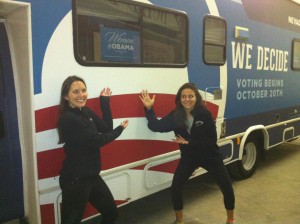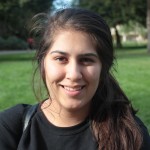
In 2008, Barack Obama’s message of hope and change inspired the support of a record number of young Americans. Sixty-six percent of 18- to 29-year-old voters marked their ballots for the country’s first African-American president, and this age group was credited with helping swing the election.
Four years later, national surveys tell another story — one of solid yet diminished enthusiasm for Obama, now a 51-year-old, swiftly graying incumbent. A poll released this week by Tufts University’s Center for Information and Research on Civic Learning & Engagement showed the president leading Republican challenger Mitt Romney 52 percent to 35 percent among likely young voters.
For months, journalists and political commentators have explored the reasons behind the numbers, with many theorizing that sluggish economic recovery was a key factor. The 12 percent unemployment rate for 18- to 29-year-olds in October well exceeded the 7.9 percent jobless figure for all Americans, according to Generation Opportunity, a nonpartisan organization that seeks to educate young people.
“It’s opened up a lot of eyes,” Izaak Pichardo, 24, the executive director of the Silicon Valley Republican Party, said of the economy.
Since graduating from UC Davis two years ago, Pichardo said he has seen many of his peers stuck in part-time jobs and moving back in with their parents. That his generation appears less excited about Obama does not surprise the Romney supporter. “We don’t start paying attention…until it hits our pocketbook,” he said.
The Peninsula Press interviewed a sampling of 18- to 29-year-old Obama supporters in San Mateo and Santa Clara counties to learn how the past four years influenced their views of the candidate.

Lacey Tarlton has experienced the hardships of the economic crisis firsthand. The 29-year-old resident of Santa Clara County said that, despite being unemployed for two years, she does not hold the president responsible for losing a job. “I don’t blame it on anybody else,” she said, citing civil rights, not economic policy, as the reason she intends to vote for Obama again.
Her emphasis on social issues was echoed by several young voters on the Peninsula, one of California’s most liberal regions. Registered Democrats outnumber their Republican counterparts by more than two to one in Santa Clara and San Mateo counties.
“To me, human rights comes before tax cuts,” said Julia LaSalvia, a senior at Stanford University. She mentioned Obama’s signing of the Lilly Ledbetter Act, which extends the period during which women can file lawsuits regarding pay discrimination, and his recent declaration of support for gay marriage as particularly inspiring.
Along with her friend Nicole DeMont, another Stanford senior, LaSalvia has been volunteering for the president’s campaign this fall. In addition to staffing phone banks, they took a recent trip to Nevada to do neighborhood canvassing in Reno.
Both recognize that the economy is a priority for many voters across the country. While they acknowledge that Obama has not led the country in a complete recovery, they blame partisan politicking for undermining his efforts.
DeMont said her enthusiasm remains high for a second Obama term. “I feel like when I’m talking about what I believe in and where I want the country to go, I know Obama is standing behind me,” she said.
A gay U.S. Army veteran, Travis Runnels said he was persuaded to vote for Obama by the president’s support for ending the military’s Don’t Ask, Don’t Tell policy. Runnels, 29, said he doesn’t always agree with liberal perspectives on fiscal issues, and he was a Republican before the 2008 election. But after a tour of duty in Iraq, he changed his mind.
“I was forced to be somebody that I wasn’t, in the name of freedom,” he said. “And I couldn’t understand how I could be fighting for freedom, but not be free myself.”
While in Iraq, Runnels asked a friend to tell his family about his sexual identity if he were to die in combat. “When I returned from Iraq…I absolutely despised the fact that I had to ask somebody to say that,” he said.
Runnels felt that his rights as a citizen were better supported by Obama than by Sen. John McCain, which swayed his vote in 2008. He noted that by ending the war in Iraq and authorizing the Navy SEAL team mission that killed Osama bin Laden, the president gained his support even more. Now living in Redwood City with his partner of four years, Runnels said that bin Laden’s death brought some closure to the years of fighting, and he recalls crying when the Iraq war ended because he was so “emotionally relieved.”

The highly charged debate over immigration reform motivates Gabriela Valencia, a junior at Santa Clara University. Like many college students, she is concerned about finding a job after she graduates. But she plans to vote for Obama, who has urged Congress to pass the DREAM Act, which would offer a path to residency for young undocumented immigrants who meet specified criteria.
As a member of MECha-El Frente, a campus group that aims to empower Latinos, Valencia has met a number of undocumented students.
“They’re very, very smart individuals,” she said. “The fact that, after graduation, after working so hard to earn their degree…[they] can’t attain a green card to work here, that’s kind of impacted my vote.”
Valencia’s parents immigrated to the Bay Area from Mexico in the 1970s. She said their sacrifices to give her a better life have made her compassionate to others trying to do the same.
“I want other people who don’t have the same opportunities as me to be able to achieve the American Dream,” Valencia said.
